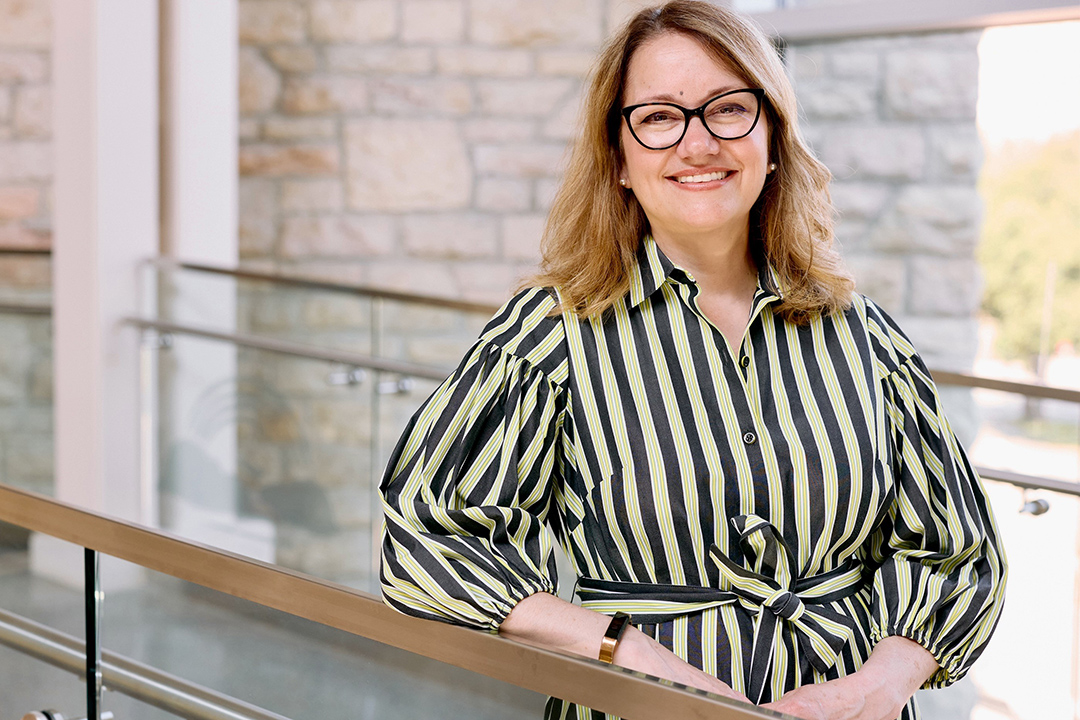
Dr. Sarah Forgie: Why the new Dean of Medicine taught herself the ukulele
In this episode, we catch up with Dr. Sarah Forgie (MD), the new dean of the College of Medicine.
By Jen Quesnel for RESEARCHERS UNDER THE SCOPE
Listen to all episodes of the Researchers Under the Scope podcast.
Researchers Under the Scope is produced by the Office of the Vice-Dean Research in the College of Medicine.
She discusses her innovative teaching methods, her career as a pediatric infectious disease specialist, and her vision for Saskatchewan’s College of Medicine.
And, why she felt compelled to teach herself the ukulele.
Born to family physicians, Forgie grew up in Lynn Lake, Manitoba, a remote fly-in mining community. Her family later relocated to Winnipeg, where Forgie credits much of her motivation to her mother, who encouraged her to pursue both medicine and leadership roles.
“Mom’s always been a trailblazer,” Forgie said, reflecting on her mother’s unwavering determination in the 1950s to graduate from medical school.
In this episode, Forgie explained her Indian-born mother’s quest to attend Lady Hardinge Medical College in Delhi, alongside her younger sister. Both sisters ultimately became physicians.
“I think about her basically turning around and bringing along other women in the family,” said Forgie. “She’s an amazing lady.”
As a pediatrician and professor at the University of Alberta, Forgie’s journey into university leadership can be traced back to her willingness to deploy creative teaching methods.
Faced with the challenge of teaching infectious diseases to first-year medical students, she re-wrote the Talking Heads hit “Psycho Killer” to reinforce best practices in treating Streptococcal pharyngitis, with ukulele accompaniment.
“Swab, swab, swab, swab, swab — they do remember that,” Forgie said. “Use antimicrobials wisely. Do a swab, confirm the diagnosis, and if it's positive, treat. And there's no urgency to treat.”
The ukulele version of "Streptococcal pharyngitis" was so catchy Forgie even remembers her four year-old son singing along.
Forgie’s engaging teaching style incorporates “memory hangers” — music, poems, and other creative tools — to help students grasp complex medical concepts. Those tools worked. Forgie researched the retention of information about abdominal abscesses in students who attended a musical lecture featuring the Dave Brubeck Quartet versus those exposed only to a standard lecture.
Those who attended her “Take Five” bacteriology lectures at the University of Alberta retained 98% of the key concepts, compared to a 50-60% retention rate among students who attended a non-musical class.
Forgie believes in instilling strong clinical reasoning in her students, consistently challenging them to present key concepts in their own creative ways.
“With every session, I would do something, they would do something, and it just made it fun,” she said.
Following her appointment as Saskatchewan’s first full-time female Dean of Medicine on July 1, 2024, Forgie returned to clinical service this fall as a pediatrician at the Jim Pattison Children’s Hospital in Saskatoon.
In her role as Dean, she aims to strengthen connections between the College of Medicine and Saskatchewan’s medical practitioners.
“What I would love to see in Saskatchewan is that every physician approaches their work with an academic lens,” Forgie said. This 'lens' may encompass participating in clinical trials, exploring ways to alleviate physician workloads, or collaborating with learners, she said.
Engagement with Indigenous communities remains a critical component of Forgie’s vision for wellness.
“I am all about collaboration... with First Nation, Inuit, and Métis communities to better prepare our trainees to work within these communities,” she said, affirming her commitment to cultural sensitivity in healthcare.
As a lifelong resident of the prairies, Forgie understands the isolation often experienced in rural medicine. She aims to foster connectivity among healthcare providers and new learners.
“How can we help and how can we reduce some of those feelings that you're having around burnout and frustration?” she asked. “Helping with that leads to a virtuous cycle of how do we make things better in Saskatchewan?”
